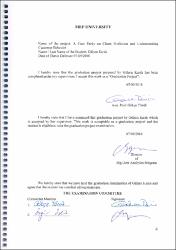Please use this identifier to cite or link to this item:
https://hdl.handle.net/20.500.11779/1182| Title: | A Case Study on Churn Prediction and Understanding Customer Behavior |
| Other Titles: | Müşteri davranışlarının anlaşılması ve ayrılma tahminine yönelik vaka analizi |
| Authors: | Kıralı, Gülşen |
| Advisors: | Tönük, Gökçe |
| Keywords: | Churn Churn Prediction Customer Behavior Purchase Attributes Machine Learning Algorithms Müşteri Kaybı Müşteri Kaybı Tahmini Müşteri Davranışları Satınalma Özellikleri Makine Öğrenme Algoritmaları |
| Publisher: | MEF Üniversitesi, Fen Bilimleri Enstitüsü |
| Source: | Kıralı, G. (2018). A case study on churn prediction and understanding customer behavior, MEF Üniversitesi Fen Bilimleri Enstitüsü, İstanbul, Türkiye |
| Abstract: | Churn prediction is essential for businesses as it helps to detect customers who have the potential to cancel a subscription to a product or service. Churn prediction techniques try to understand the certain customer behaviors and attributes which signal the risk and
timing of customer churn. Companies started to focus on retention activities more in the last years since holding current customer in the system is less costly when compared with acquiring new ones. In order to allocate costs to right customers, companies prefer to use the big part of these budget to potential churn customers which makes the accuracy of churn detection important for us. The objective of this project is to develop a machine learning algorithm that predicts potential churn customers that will not make any transactions in the following three months. While predicting churn, some customer segments and subsegments are created in order to understand the common behavior of potential churn customers. Common characteristics of loyal customers will also be
investigated in order to determine churn prevention marketing activities for potential churn customers. Among all of the machine learning algorithm trials including Logistic Regression, Boosted Decision Tree, Support Vector Machines, Decision Forest, Decision Forest Regression and Neural Networks, Logistic Regression predicts with the highest accuracy and lowest number of False Negative which means model slightly mistaken unchurned customers. Müşteri ayrılma tahminleri, bir ürün veya hizmete aboneliği iptal etme potansiyeline sahip müşterileri tespit etmeye yardımcı olduğu için günümüzde çok önem kazanmaya başlamıştır. Müşteri ayrılma tahminleri, müşteri kaybının riskini ve zamanlamasını yansıtan belirli müşteri davranışlarını ve niteliklerini anlamaya çalışır. Mevcut müşterileri sistemde tutmak, yeni müşteri kazanmaya kıyasla daha az maliyetli olduğundan son yıllarda şirketler elde tutma faaliyetlerine odaklanmaya başlamıştır. Şirketler, oldukça maliyetli olan bu aktiviteleri doğru müşterilere uygulamak için bütçelerinin büyük bölümünü, ayrılma potansiyeli yüksek müşterilere kullanmayı tercih etmektedirler, bu da şirketler için ayrılma tahmininin doğruluğunun önemini ortaya koymaktadır. Projenin amacı belirli bir şirket müşteri verisi kullanılarak takip eden üç ay içinde işlem yapmayacak ve ayrılacak müşterileri tahmin etmektir. Müşteri ayrılma tahmini yapılırken, alışveriş alışkanlıklarına dayalı gruplar oluşturularak ayrılan müşterilerin ortak özellikleri anlaşılmaya çalışılmıştır. Ayrılma ihtimali olan müşterilere yönelik pazarlama aktivitelerini belirlemek için aynı zamanda sadık müşterilerin ortak davranışları incelenmiştir. Projede Güçlendirilmiş Karar Ağacı, Destek Vektör Makineleri, Rastgele Ormanlar, Rastgele Ormanlar Regresyonu ve Yapay Sinir Ağları algoritmaları denenmiştir. Lojistik Regresyon modeli ile en yüksek doğruluk oranına ulaşılmış ve ayrılmayacak müşterileri yanlış tahmin adedi en düşük düzeyde gerçekleşmiştir. |
| URI: | https://hdl.handle.net/20.500.11779/1182 |
| Appears in Collections: | FBE, Yüksek Lisans, Proje Koleksiyonu |
Files in This Item:
| File | Description | Size | Format | |
|---|---|---|---|---|
| GülşenKıralı.pdf | YL- PROJE DOSYASI | 4.1 MB | Adobe PDF |  View/Open |
CORE Recommender
Sorry the service is unavailable at the moment. Please try again later.
Items in GCRIS Repository are protected by copyright, with all rights reserved, unless otherwise indicated.